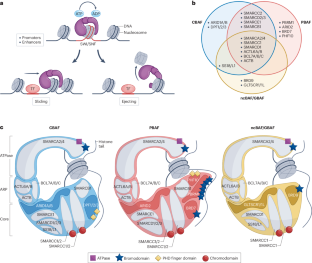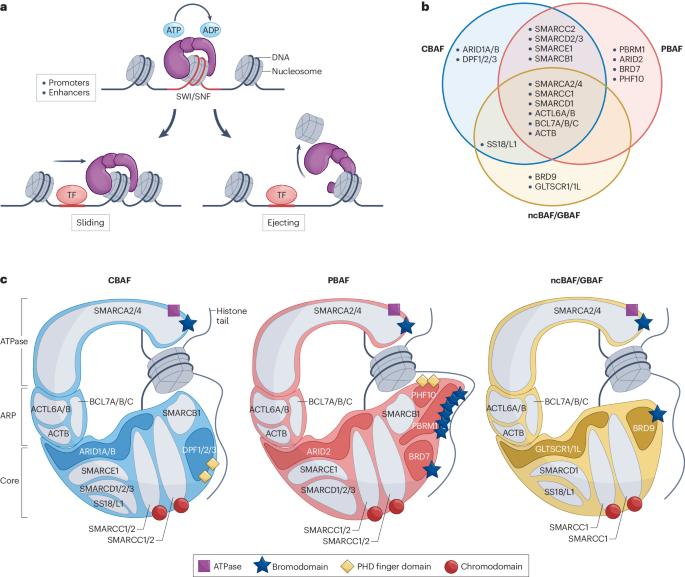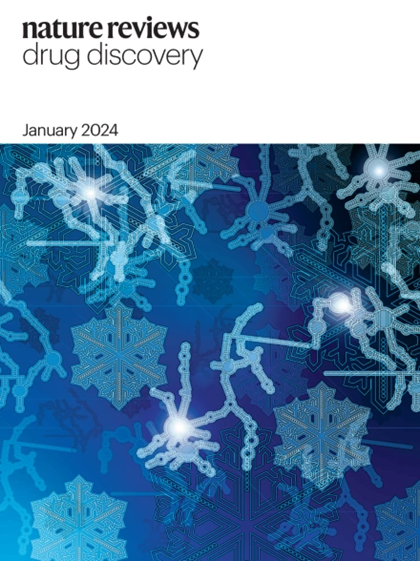Chromatin remodellers as therapeutic targets
IF 122.7
1区 医学
Q1 BIOTECHNOLOGY & APPLIED MICROBIOLOGY
引用次数: 0
Abstract
Large-scale cancer genome sequencing studies have revealed that chromatin regulators are frequently mutated in cancer. In particular, more than 20% of cancers harbour mutations in genes that encode subunits of SWI/SNF (BAF) chromatin remodelling complexes. Additional links of SWI/SNF complexes to disease have emerged with the findings that some oncogenes drive transformation by co-opting SWI/SNF function and that germline mutations in select SWI/SNF subunits are the basis of several neurodevelopmental disorders. Other chromatin remodellers, including members of the ISWI, CHD and INO80/SWR complexes, have also been linked to cancer and developmental disorders. Consequently, therapeutic manipulation of SWI/SNF and other remodelling complexes has become of great interest, and drugs that target SWI/SNF subunits have entered clinical trials. Genome-wide perturbation screens in cancer cell lines with SWI/SNF mutations have identified additional synthetic lethal targets and led to further compounds in clinical trials, including one that has progressed to FDA approval. Here, we review the progress in understanding the structure and function of SWI/SNF and other chromatin remodelling complexes, mechanisms by which SWI/SNF mutations cause cancer and neurological diseases, vulnerabilities that arise because of these mutations and efforts to target SWI/SNF complexes and synthetic lethal targets for therapeutic benefit. Mutations in genes that encode subunits of the SWI/SNF chromatin remodelling complexes are found in more than 20% of cancers as well as in certain neurodevelopmental disorders. This Review discusses mechanisms by which SWI/SNF mutations lead to disease and the strategies to target SWI/SNF complexes and synthetic lethal targets for therapeutic benefit.


作为治疗靶点的染色质重塑器
大规模癌症基因组测序研究发现,染色质调节因子在癌症中经常发生突变。特别是,20%以上的癌症都存在编码SWI/SNF(BAF)染色质重塑复合物亚基的基因突变。SWI/SNF复合物与疾病的其他联系已经显现,研究发现,一些癌基因通过共用SWI/SNF功能来驱动转化,而某些SWI/SNF亚基的种系突变是导致多种神经发育疾病的基础。其他染色质重塑因子,包括 ISWI、CHD 和 INO80/SWR 复合物的成员,也与癌症和发育障碍有关。因此,对 SWI/SNF 和其他重塑复合物的治疗操作已引起人们的极大兴趣,针对 SWI/SNF 亚基的药物已进入临床试验阶段。在具有 SWI/SNF 突变的癌细胞系中进行的全基因组扰动筛选发现了更多的合成致死靶点,并导致更多化合物进入临床试验阶段,其中一种化合物已获得 FDA 批准。在此,我们回顾了在了解 SWI/SNF 及其他染色质重塑复合物的结构和功能、SWI/SNF 基因突变导致癌症和神经系统疾病的机制、这些基因突变导致的脆弱性以及针对 SWI/SNF 复合物和合成致死靶点进行治疗的努力方面所取得的进展。
本文章由计算机程序翻译,如有差异,请以英文原文为准。
求助全文
约1分钟内获得全文
求助全文
来源期刊

Nature Reviews. Drug Discovery
医学-生物工程与应用微生物
CiteScore
137.40
自引率
0.30%
发文量
227
期刊介绍:
Nature Reviews Drug Discovery is a monthly journal aimed at everyone working in the drug discovery and development arena.
Each issue includes:
Highest-quality reviews and perspectives covering a broad scope.
News stories investigating the hottest topics in drug discovery.
Timely summaries of key primary research papers.
Concise updates on the latest advances in areas such as new drug approvals, patent law, and emerging industry trends and strategies.
 求助内容:
求助内容: 应助结果提醒方式:
应助结果提醒方式:


